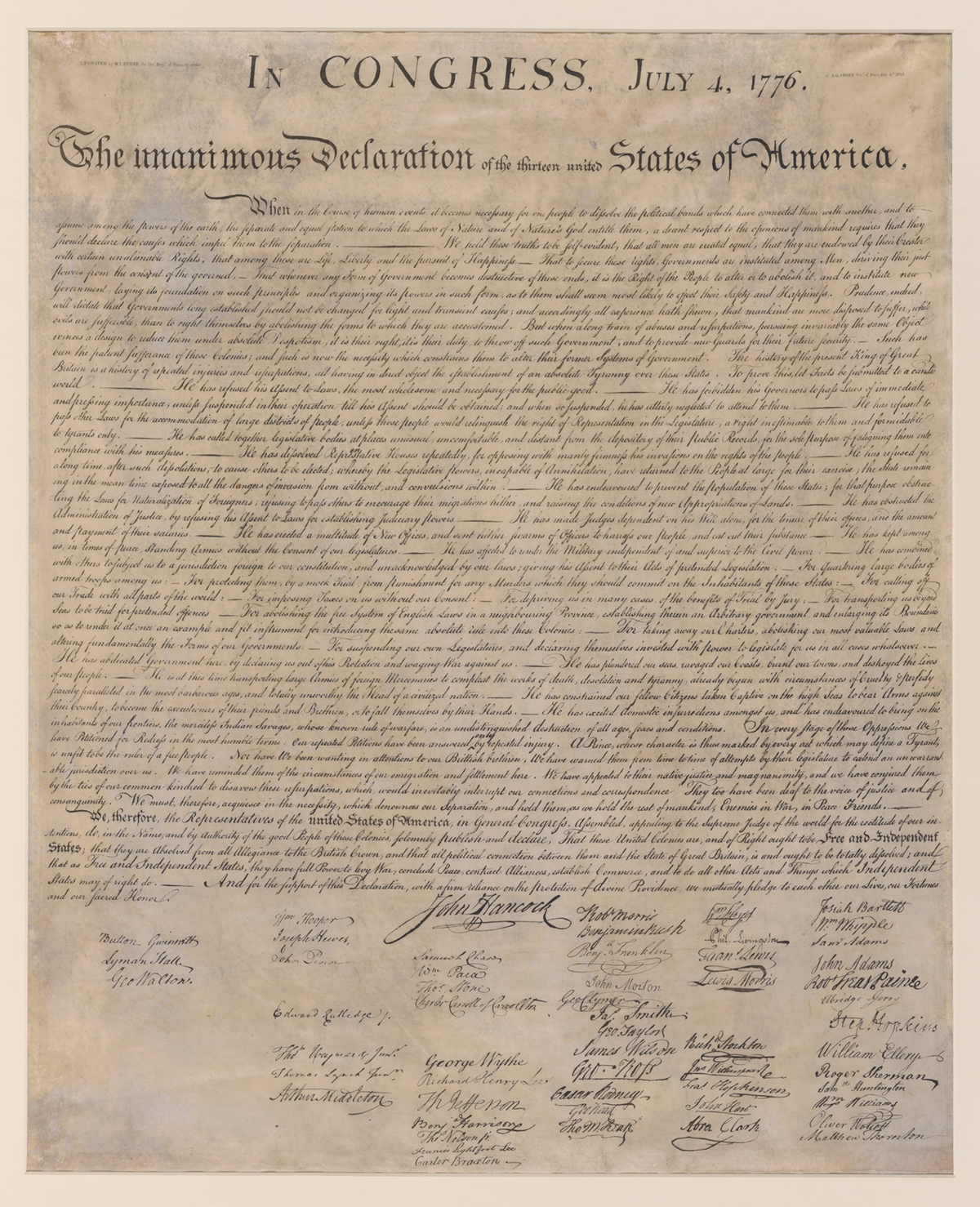On 4 July 1776, the Philadelphia State House was packed, despite a sweltering heat, as Secretary Charles Thomson of Derry read a Declaration that Adams, Jefferson, Franklin and Livingston had composed and that he, Thomson, had drafted. It was a declaration explaining why their revolutionary action was justified. After a full day of debate, modifying copy and amendments, Secretary Thomson recorded the changes and America’s Declaration of Independence was complete! The formal copy would not be ready for signature until August, but the public first heard that document read on 8 July 1776 by Col. John Nixon, son of a Wexford immigrant. Philadelphia printer Charles Dunlap of Tyrone rolled out copies that were snatched up before the ink was dry. Among the courageous men who signed that Declaration of Independence were eight Irish Americans, three of whom were Irish born. To sign this momentous document was an act of high treason against the British Crown. All the signers could be executed and their estates confiscated, thereby impoverishing their families. But, they hated monarchy and their spirit of independence is at the heart of the Republic they would crucially help to form. Their brand of defiance saw through British imperialism and used Enlightenment ideas to create a nation of free people. Those Irish signers were:
Thomas McKean was born in Pennsylvania on 19 March 1734 to William McKean from County Antrim and Letitia Finney McKean whose family also emigrated from Ireland. He became an American lawyer and politician, serving as President of Delaware, Chief Justice and then Governor of Pennsylvania. During the American Revolution, he was a delegate to the Continental Congress where he signed the Declaration of Independence and served as a President of Congress. Thomas McKean led the movement in Delaware for American independence and served as commander of a patriot militia group known as the Pennsylvania Associators. He died on 24 June 1817.
Charles Carroll of Carrollton in Maryland was born on 19 September 1737 and was the only Catholic and the longest-living signatory of the Declaration of Independence, dying at age 95 on 14 November 1832. He was held up by Catholic Americans as proof of their patriotism in an America largely run by a WASP establishment until JFK’s election. He is descended from the Tipperary clan Ó Cearbhail who trace their origin to The Cianachta, a tribe recorded to the third century AD. At the time, Maryland was the only colony tolerant of Catholic immigration, thanks to Lord Baltimore.
James Smith was born in Ireland about 1719 and his family was forced to emigrate to the American colonies due to abuse by landlords. Smith emerged as a leading lawyer of his day and wrote legal opinions denying the constitutional power of Great Britain over the American colonies. He also urged an end to the import of British goods. He raised a militia group in York, PA and joined the American Continental Congress in July 1775, a year before the Declaration was ratified. Smith would become a member of the Continental Congress in 1776 and serve in the War of Independence as a Colonel of Pennsylvania Militia. He died 11 July 1806.
George Taylor was born in Antrim in 1716 and emigrated to the American colonies in 1736. Taylor operated a furnace and was an iron manufacturer in Pennsylvania. He was a member of the Committee of Correspondence from 1774 to 1776 and of the Continental Congress in 1776 and 1777. Taylor is a name common in Ireland since the fourteenth century.
Matthew Thornton was born in Limerick on St. Patrick’s Day, 1713 and came out to America as a four-year-old child in the passage of five ships carrying 120 Irish families from the Bann Valley. He would practice medicine and become active in pre-revolutionary agitation before being elected to become a member of the Continental Congress in 1776. He was a Colonel of New Hampshire Militia from 1775 to 1783. He died on 24 June 1803.
Edward Rutledge was born in Charleston, South Carolina on 23 November 1749 and was the youngest signer of the Declaration of Independence. His father Dr. John Rutledge left Tyrone in 1735 and his sons, John and Edward were elected to the Continental Congress in July 1774. John was later Governor of South Carolina. Edward died on 23 January 1800.
Thomas Lynch Jr. Was the grandson of Jonas Lynch of Galway who was exiled after the defeats at Aughrim and the Boyne. Thomas

